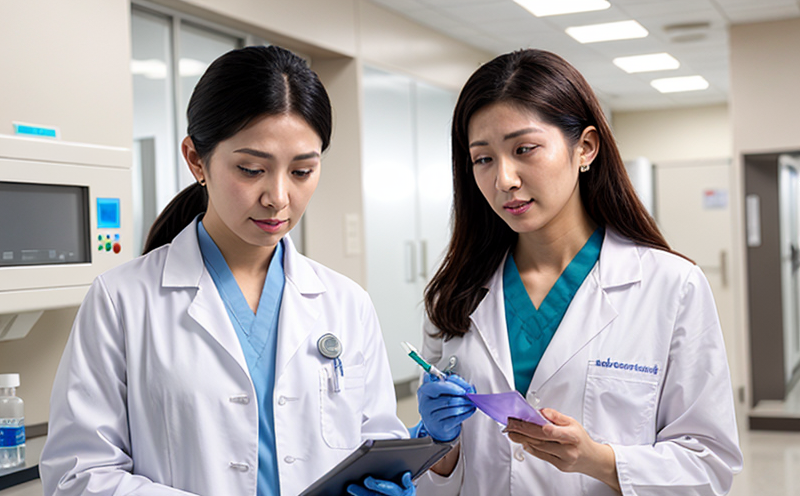Cytotoxicity Testing of Antibody Drug Conjugates
The development and testing of antibody drug conjugates (ADCs) represents a significant advancement in biopharmaceutical research. ADCs are a type of therapeutic agent that combines the targeting ability of antibodies with the cytotoxic action of drugs, making them highly effective for treating cancer and other diseases. Cytotoxicity testing is an essential step in ensuring these agents are safe and effective.
At our laboratory, we specialize in providing comprehensive cytotoxicity testing services for ADCs. This service involves a series of rigorous tests designed to evaluate the toxicity levels of drugs conjugated to monoclonal antibodies. The goal is to determine whether the drug payload can induce cell death or damage without affecting non-target cells.
The testing process begins with the preparation of various test systems, including but not limited to cell lines that are relevant to the target disease. For ADCs targeting solid tumors, common cell lines such as A549 (lung carcinoma), HeLa (cervical cancer), and MCF-7 (breast cancer) may be used. These cells are exposed to different concentrations of the ADC under controlled conditions.
Following exposure, a range of assays is employed to measure cytotoxicity. Common methods include the lactate dehydrogenase (LDH) release assay, which detects cell membrane integrity and leakage indicative of cell death; the trypan blue exclusion test, used for counting viable cells by excluding dead or dying cells from the population; and the MTT (3-(4,5-dimethylthiazol-2-yl)-2,5-diphenyltetrazolium bromide) reduction assay, which measures mitochondrial activity.
For ADCs targeting specific receptors on target cells, a more sophisticated approach is required. This involves flow cytometry to assess the internalization of the ADC into the cell and subsequent intracellular delivery of the drug payload. Additionally, time-lapse microscopy can be used to observe the interaction between the ADC and the target cells over extended periods.
The results from these tests are analyzed using statistical methods to establish a dose-response relationship between the concentration of the ADC and observed cytotoxic effects. This information is crucial for optimizing the drug-to-antibody ratio (DAR) and ensuring that the therapeutic index of the ADC is maximized.
Our laboratory adheres strictly to international standards such as ISO 17025, which ensures our testing methods are up to the highest industry standards. We also follow relevant guidelines from regulatory bodies like the FDA and EMA for biopharmaceutical product development.
In summary, cytotoxicity testing of ADCs is a complex but vital process that requires precise instrumentation and robust analytical techniques. Our laboratory offers this service with state-of-the-art equipment and experienced personnel to ensure accurate and reliable results.
Customer Impact and Satisfaction
The testing of ADCs is critical for pharmaceutical companies involved in biopharmaceutical development. By ensuring that the cytotoxicity levels are within acceptable limits, we help our clients reduce the risk of adverse effects during clinical trials and post-market use. This not only enhances patient safety but also streamlines the regulatory approval process.
Our customers have reported significant benefits from using our services. They can focus more on drug development while leaving the complex testing to us, thereby saving time and resources. The accurate data provided by our tests enables them to make informed decisions about the next steps in their product lifecycle.
We strive for customer satisfaction through excellent service delivery, timely results, and clear communication. Our clients often provide positive feedback on how our support has contributed to successful outcomes in their projects. We are committed to maintaining high standards of quality and reliability, which is reflected in the trust placed by our customers.
International Acceptance and Recognition
- Cytotoxicity testing for ADCs is recognized by major regulatory bodies such as the FDA (Food and Drug Administration) and EMA (European Medicines Agency).
- The ISO 17025 accreditation ensures our laboratory meets international standards for technical competence.
- Our tests are accepted in multiple countries, including the United States, Europe, Japan, and Australia.
- We follow the guidelines set by organizations like ICH (International Council for Harmonization of Technical Requirements for Pharmaceuticals for Human Use).
Environmental and Sustainability Contributions
In our commitment to sustainability, we adopt practices that minimize waste and optimize resource use. Our laboratory uses energy-efficient equipment and implements recycling programs for hazardous materials generated during testing.
We also participate in initiatives aimed at reducing the carbon footprint of pharmaceutical research. By providing reliable testing services, we help clients make informed decisions that can lead to more effective treatments with minimized environmental impact.





